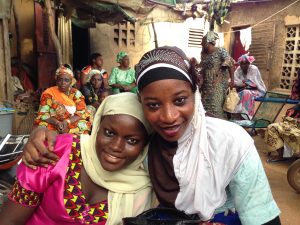Our 2021 Plan – Support Startups for Social Change
In 2021 The Advocacy Project will support the 15 projects listed on this page. More may be added.
Twelve of the projects will take the form of startups in Uganda, Zimbabwe, Nepal, Kenya, Mali and the United States. All have been designed by survivors of discrimination or abuse and will be managed by a local AP partner with back-up from AP.
Working remotely, AP will help the partner to draw up a budget and set short-term goals (4-6 months). We will also offer $1,000 in seed money. If the goals are met, we will help the partner to scale the startup and seek increased funding in June. If these goals are met after 18 months we will work with the partner to develop a long-term program (3-5 years).
Each startup will be supported by a team of one or more students (Peace Fellows) who will offer a range of support (website training, money management, reporting to donors etc). Fellows will also be encouraged to produce a research paper in conjunction with their school, to be done remotely or in person if travel permits.
We are working on the assumption that all of our support for partners will be remote for the first part of 2021. If opportunities open up for field work, we will ask Peace Fellows deployed abroad to help their hosts develop or support a startup along the lines described above.
All students who volunteer through AP will be considered Peace Fellows, starting January 2021. Click here to apply for a 2021 fellowship.
Use Soap To Empower Girls in Zimbabwe
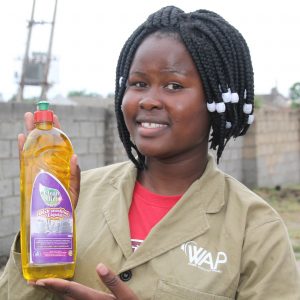 Women Advocacy Project (WAP) has trained 80 girls like Trish to make and sell Clean Girl soap, so as to improve hygiene in their communities, earn money for their families, and resist child marriage. Their target for 2021 is 16,000 bottles. AP will provide all-round support. We will focus in particular on March when WAP will reach out to scores of women’s groups across the US that are affiliated with Dining for Women, a major WAP donor. Read how soap can protect against early marriage and watch our movie about the girls at work (and play)! Read the blogs of past Fellows: Alex (2018) and McLane (2019).
|
Use Composting to Improve Nutrition in Kibera
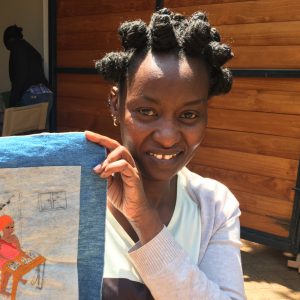 Led by Stella, the Tandaza Trust has launched an experiment with 11 families to improve nutrition in the Kibera settlement of Nairobi by using vermiculture and composting. We are excited to provide advice and find composters in the US that will partner with this pioneering project!
|
|
|
Improve Hygiene and Lift Enrollment in Ugandan Schools
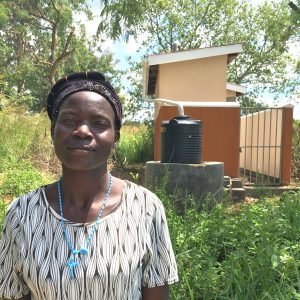 The Gulu Disabled Persons Union (GDPU) will install accessible toilets and hand-washing at the Lapuda School in Gulu, Uganda (350 students) under the direction of the school’s dynamic Principal Evelyn. Watch our movie about the appalling state of toilets at Lapuda and read how WASH can lift school enrollment. Find more background on the WASH project and profiles of beneficiaries here. Read the blogs of past Fellows, including Josh (2015); Amy (2016); Lauren (2017); Chris (2018); and Wilson (2020).
|
|
|
Create a Micro-business for Face-masks in Gulu, Uganda
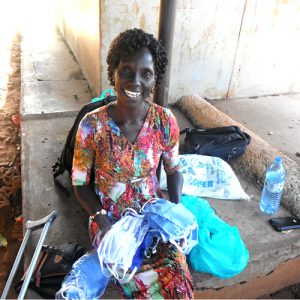 Mentored by the GDPU and AP, Mama Cave plans to scale her successful mask-making micro-business and produce 5,000 Mama face-masks in Gulu, Uganda. She is targeting primary schools. Learn how it all began.
|
|
|
Make Soap and Improve Hygiene in Gulu, Uganda
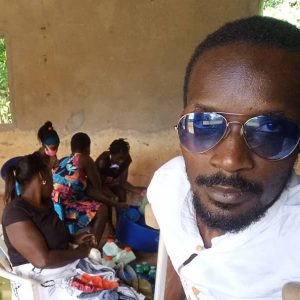 Freeman and his team of soap-makers with limited mobility will build on a successful launch in 2020 and produce 6,000 liters of Clean Wash soap in 2021. Like Mama Cave, they hope to service primary schools.
|
|
|
Produce Dinnerware for Relatives of the Disappeared in Nepal
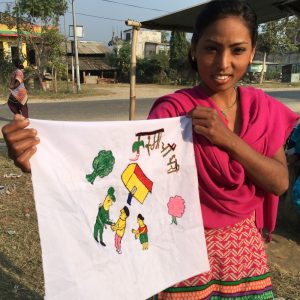 AP will help artists like Kushma in Western Nepal to use their embroidery skills to design scenes of village life. The designs will then be painted on to sets of dinnerware. Working closely with the artists we hope to make and market ten sample sets in the US. The artists have produced two Memorial quilts that commemorate their lost loved ones: Watch our movie of the quilts being made; view profiles of the artists and their designs; read about their advocacy. Read the blogs of past Fellows: Megan (2016); Vicky (2017); Kirstin (2017); Komal (2018); and Beth (2020).
|
|
|
Nominate Our Kenyan Partner for the 2022 Nobel Peace Prize
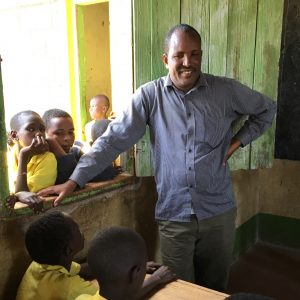 AP will work with Children Peace Initiative Kenya to nominate Hilary, the CPIK founder, for his work in reducing conflict between pastoralists caused by climate change. Read more about Hilary’s remarkable work through the blogs of past Fellows – Talley, Colleen and Ben. Read more on the CPIK model of peace-building, and profiles of beneficiaries.
|
|
|
Empower Kidnap Victims of the LRA in Uganda
 AP will help Victoria to launch a startup for women who were kidnapped by the LRA as schoolgirls. They want to describe their ordeal through embroidery and produce an advocacy quilt. Our website carries profiles of over 50 quilts and hundreds of artists. Watch Victoria’s powerful statement to the 2014 conference on Human Security, organized by the Swiss Foreign Ministry, describing her own years of captivity and abuse.
|
|
|
Sister Artists 2 – Auction Animal Quilts from Kenya
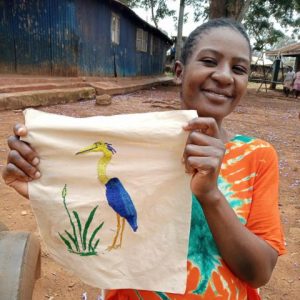
|
|
|
Describe the Impact of COVID-19 through Advocacy Quilts
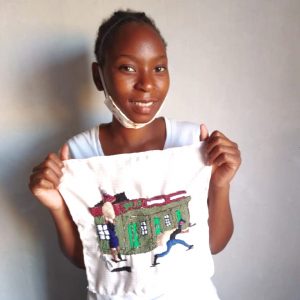
|
|
|
Virtual Exhibition of Advocacy Quilts
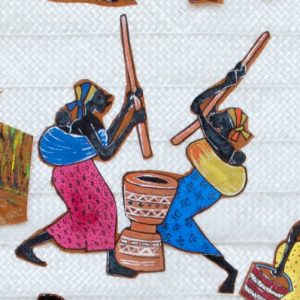 A team of skilled techies will shortly create a virtual gallery of our advocacy quilts including the Ugandan Nature Quilt. We look forward to working with them and will promote the exhibition throughout 2021. All proceeds will go to the artists and partners that coordinated the making of the quilts. The Nature Quilt is made from 10,000 recycled straws. Read how it was made here, and about the Ugandan Nature Quilt and check out the blogs of Scarlett, who helped to coordinate the quilt-making.
|
|
|
Catalogue of Advocacy Quilts
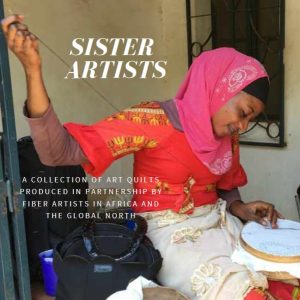
|
|
|
Sell 50 Tiger Bags Made by Wives of the Disappeared
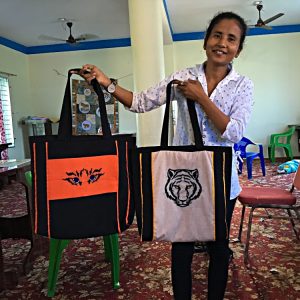 Sarita is one of several artists in Nepal who have designed her own Tiger bag and added her woven signature to create her own brand. AP will market the bags in the US in 2021 and build a coalition of support for the artists in the conservation and human rights movements. The artists have also produced two Memorial quilts that commemorate their lost loved ones: Watch our movie of the quilts being made; view profiles of the artists and their designs; read about their advocacy. Read the blogs of past Fellows: Megan (2016); Vicky (2017); Kirstin (2017); Komal (2018); and Beth (2020).
|
|
|
Producing Animal Bags in Bamako, Mali
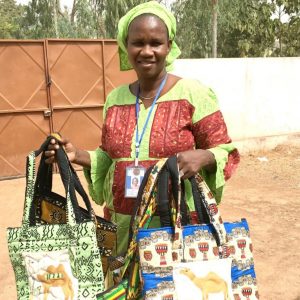 Habi, an expert tailor, is using proceeds from the first Sister Artists auction to train 25 survivors of gender-based violence in Mali to make sample tote bags from traditional Malian designs. We hope to market the bags in the US in 2021. Read our report about GBV in Mali. Read the blogs of past Fellows: Giorgia (2014); Reflilwe (2015); and Rose (2016).
|
|
|
Auction a Refugee Quilt from Jordan
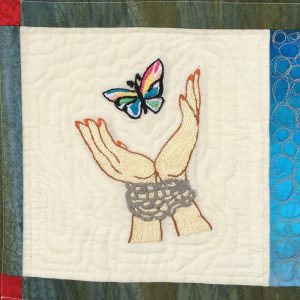 |
|
|
|
|

